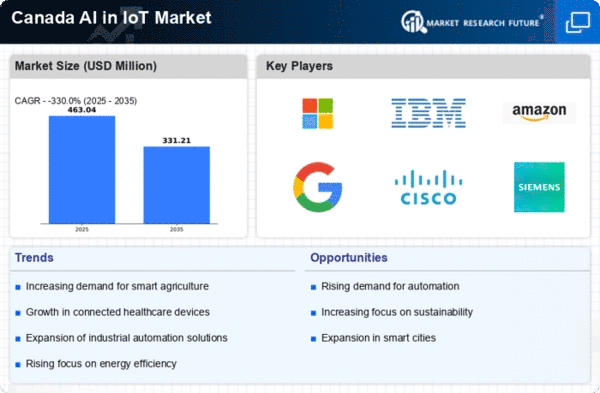Rising Demand for Automation
The AI in IoT Market in Canada is experiencing a notable surge in demand for automation across various sectors. Industries such as manufacturing, agriculture, and healthcare are increasingly adopting IoT devices integrated with AI capabilities to enhance operational efficiency. This trend is driven by the need to reduce labor costs and improve productivity. According to recent data, the automation market in Canada is projected to grow at a CAGR of approximately 10% over the next five years. As businesses seek to streamline processes and minimize human error, the integration of AI in IoT systems becomes essential. This rising demand for automation is likely to propel the growth of the ai in-iot market, as companies invest in smart technologies to remain competitive.
Increased Focus on Sustainability
Sustainability is becoming a central theme in the Canadian ai in-iot market, as businesses and consumers alike prioritize eco-friendly practices. The integration of AI with IoT devices allows for better resource management and energy efficiency, which aligns with the growing demand for sustainable solutions. For example, smart agriculture technologies that utilize AI can optimize water usage and reduce waste, contributing to environmental conservation. The Canadian government has set ambitious targets for reducing greenhouse gas emissions, which further encourages the adoption of sustainable technologies. This focus on sustainability is likely to drive innovation within the ai in-iot market, as companies develop solutions that not only meet regulatory requirements but also appeal to environmentally conscious consumers.
Government Initiatives and Support
Government initiatives in Canada are playing a crucial role in fostering the growth of the ai in-iot market. Various programs and funding opportunities are being introduced to encourage innovation and the adoption of smart technologies. For instance, the Canadian government has allocated significant resources to support research and development in AI and IoT sectors. This support is expected to enhance collaboration between public and private sectors, leading to the creation of advanced solutions. Furthermore, the government's commitment to digital transformation is likely to stimulate investments in the ai in-iot market, as businesses leverage these initiatives to enhance their technological capabilities and improve service delivery.
Growing Consumer Awareness and Adoption
Consumer awareness regarding the benefits of AI and IoT technologies is on the rise in Canada, which is positively influencing the ai in-iot market. As individuals become more informed about the advantages of smart devices, there is a corresponding increase in demand for connected solutions in homes and businesses. This trend is evident in the growing popularity of smart home devices, wearables, and industrial IoT applications. Market Research Future indicates that the adoption rate of smart home technologies is expected to reach 30% by 2026. This growing consumer awareness is likely to drive innovation and competition within the ai in-iot market, as companies strive to meet the evolving needs and preferences of tech-savvy consumers.
Advancements in Connectivity Technologies
The evolution of connectivity technologies, such as 5G, is significantly impacting the ai in-iot market in Canada. Enhanced connectivity enables faster data transmission and improved communication between devices, which is essential for the effective functioning of AI-driven IoT systems. As 5G networks continue to roll out across the country, businesses are likely to leverage these advancements to deploy more sophisticated IoT applications. This increased connectivity can facilitate real-time data analysis and decision-making, which are critical for industries like transportation and logistics. Consequently, the advancements in connectivity technologies are expected to bolster the growth of the ai in-iot market, as companies seek to harness the full potential of their IoT investments.
















